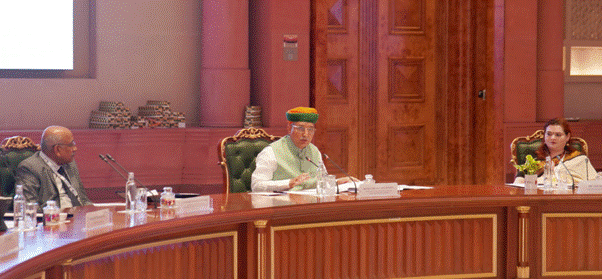Ministry of Law and Justice
Union Minister of State (Independent Charge) for Law and Justice & Parliamentary Affairs, Shri Arjun Ram Meghwal emphasises, “India will become the arbitration hub”
Building India’s Arbitration Future:
National Conference On “Institutional Arbitration: An Effective Framework For Dispute Resolution” organised at Bharat Mandapam
Posted On:
15 JUN 2025 5:24PM by PIB Delhi
In a push to fortify India’s position as a global arbitration hub, a National Conference on Institutional Arbitration was organised by the Department of Legal Affairs, Ministry of Law & Justice, in collaboration with ONGC and the India International Arbitration Centre (IIAC) at Bharat Mandapam, New Delhi, on June 14, 2025.
The day-long Conference brought together senior officials from the Ministry of Law and Justice, representatives of Central Public Sector Enterprises (CPSEs), legal experts and arbitration professionals. The aim was to promote institutional arbitration as the preferred mode of commercial dispute resolution and to highlight the IIAC as a globally competitive arbitral institution.
Union Minister of State (Independent Charge) for Law and Justice & Parliamentary Affairs, Shri Arjun Ram Meghwal graced the occasion as Guest of Honour. In his address, he bridged India’s modern legal aspirations with its philosophical history, referencing the country’s ancient tradition of consensual dispute resolution and stating that arbitration is deeply rooted in Indian culture. Affirming the Government’s vision with conviction, he stated that “India will become the arbitration hub.”
The inaugural session opened with a welcome address by Hon’ble Shri Justice Hemant Gupta (Retd.), Chairperson, IIAC, who discussed key challenges hindering the growth of institutional arbitration in India, particularly the continued reliance on ad hoc mechanisms. He emphasised the transition from the erstwhile International Centre For Alternative Dispute Resolution (ICADR) to IIAC as a significant move by the Government and stressed the need for Public Sector Undertakings (PSUs) to adopt structured institutional frameworks. Shri Avnit Singh Arora, Director, Department of Legal Affairs, followed with a detailed presentation outlining the legislative strides and policy reforms undertaken by the Department over the last decade.
Shri Arun Kumar Singh, Chairman, Oil and Natural Gas Corporation Limited (ONGC), brought an industry perspective, calling for faster, institutionalised arbitration processes. He remarked, “Timeliness, not timelessness, should be the ethos of our legal systems.” Shri K Moses Chalai, Secretary, Department of Public Enterprises, echoed the thought, highlighting that effective arbitration directly affects governance, operational efficiency and the economic health of CPSEs.
Dr. Anju Rathi Rana, Secretary, Department of Legal Affairs, Ministry of Law & Justice provided a comprehensive overview of legal reforms — from repealing obsolete laws to digitising the court system. She emphasised the Government’s vision to develop IIAC as a world-class arbitral institution, at par with leading international arbitration centres, particularly by incorporating dispute resolution clauses in PSU contracts that designate IIAC as the preferred institution of arbitration.

Union Minister of State (Independent Charge) for Law and Justice & Parliamentary Affairs, Shri Arjun Ram Meghwal chairs a conference held on the “Institutional Arbitration: An Effective Framework for Dispute Resolution” at Bharat Mandapam in New Delhi
Following the inaugural session, the Conference featured four technical sessions, each delving into key aspects of institutional arbitration. In addition to the participation of over 150 distinguished delegates, the Conference witnessed strong virtual engagement with over 700 views on Facebook and more than 900 live views on YouTube.
The first session, “Strengthening Dispute Resolution in PSUs: The Role of Institutional Arbitration”, addressed public sector-specific challenges and institutional arbitration’s potential in transforming the dispute resolution landscape, particularly concerning infrastructure and public sector contracts. Speakers highlighted the need for capacity-building and called for structured, institutional processes over fragmented ad hoc mechanisms, with support from bodies like IIAC. The second session took a close look at the IIAC (Conduct of Arbitration) Regulations, 2023, breaking down key provisions and their practical relevance. A short film was also screened, showcasing IIAC’s state-of-the-art infrastructure and signalling India’s readiness to handle complex, high-stakes arbitrations.
The third session, “Best Practices During Arbitral Process — A Discourse”, focused on procedural and institutional best practices to enhance the effectiveness of arbitration. Speakers advocated for structured case management, suggesting that their regularisation under institutional rules would enhance clarity, expedite timelines, and minimise ambiguities in the arbitral process. The fourth session focused on learnings from international jurisdictions and the way ahead for the arbitration ecosystem in India. The discussion included global practices, emergency arbitration and access to legal research tools to make arbitration more accessible. The technical sessions concluded with a vote of thanks by Shri Ganesh Chandru, part-time member, IIAC.
As India rapidly expands its global footprint, the Conference set the tone for the country’s next leap in arbitration excellence, anchored in institutional strength and international best practices.
***
Samrat/Allen: pibpiolaw[at]gmail[dot]com
(Release ID: 2136475)
Visitor Counter : 325